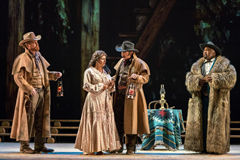| Opera Reviews | 26 April 2024 |
Puccini’s beloved Fanciulla comes homeby Arlene Judith Klotzko |
|
| Puccini: La fanciulla del West New York City Opera 8 September 2017 |
|
|
Puccini excelled in creating a sense of place unique to each of his operas. Here, in just a brief orchestral introduction, he used ingenious musical means to conjure up the vastness of the early 20th century American west and the raucous energy of adventurers who strike out to seek their fortune. For this production, the versatile Ivan Stefanutti acts as stage director, and set, costume, and projection designer. He fills the back of the stage with economical but apt projections of forests, mountains, valleys, and cowboys in silhouette. The sets are very basic, while the costumes run the gamut between the prosaic and the dull to over the top ankle length fur coats and Jack Rance’s very bright blue ensemble. The opera is virtually through composed; it’s a music drama. The score is a tapestry woven from short musical figures which create tension (as with the pulse in the poker scene) and mood (such as the ominous, growling ostinato at the beginning of act three). The music is a marvel of harmonic and rhythmic invention, lovely melodies, and a vast orchestral palette. There is so much for the orchestra to convey and, under James Meena’s deft leadership, they are superb. The icons of American western films – John Wayne, Gary Cooper and Clint Eastwood to name just three – manifest heroism, machismo, self-reliance, and stoicism in the face of adversity. These are certainly not the sort of cowboys Puccini had in mind. Everyone in this opera is lonely, vulnerable, and longing for connection. The overarching mood is first heard in the act one lament of Jake Wallace (the fine baritone, Kenneth Overton). The chorus joins in, singing in harmony with individual voices bursting forth, most notably that of Larkens (Darren K. Stokes). He is so homesick, so despairing, that the others take up a collection to send him home to his mother. The effect of the choral singing is beautiful and haunting. In the vastness of the western landscape, individuals are isolated, devastated, and bereft. But they cling to each other in their vulnerability. All of the characters – Dick Johnson, Minnie and even Rance (who needs Minnie’s love and warmth) -- appear as rather lost souls. These lonely and desolate men are given hope and comfort by one person – Minnie. She’s the solid maternal figure who also enchants the evil Sheriff Rance and the tender hearted Sonora. She is also the tough and fearless woman who rescues her beloved as he is about to be hanged. She symbolizes for all of the other characters sweetness, kindness, love and family. But she is also vulnerable and lonely until she falls in love with Johnson. When she leaves her miners to start a new life with the reformed Dick Johnson they are utterly devastated. So this very unusual happy ending for a Puccini opera is clouded with despair. What a complex and fascinating character Puccini has drawn in Minnie. What a challenge it must be – vocally and dramatically – to portray her. Kristin Sampson meets the challenge. She is diminutive but also dominates. She is a fine singing actress, conveying a range of behaviors and emotions. She is a strong yet vulnerable to love. Sampson’s large clear voice easily carries over the orchestra. And she is excellent at putting across the text. Jonathan Burton as Dick Johnson sings with clarion top notes and fine legato. As the disguised bandit Ramirez, he comes to steal the miners’ gold but ends up stealing so much more. He takes their Minnie and, with her, their hope and consolation. His performance of the opera’s most famous aria “Ch’ella mi creda” is deeply moving. The booming bass baritone Kevin Short is Sheriff Jack Rance, throwing himself into the part – snarling, threatening but still vulnerable in his desire for Minnie. Alexander Birch Elliott as Sonora, is touchingly and convincingly besotted with her. He has a mellifluous baritone and a handsome stage presence. Hyona Kim as Minnie’s maid, Wowkle, sings with a beautifully colored rich mezzo soprano. The entire supporting cast acquit themselves very well and, as a chorus, they are extraordinary. There is much to look forward to from the New York City Opera this season, including a rare recital by the marvelous and seldom seen on this side of the Atlantic, soprano, Anna Caterina Antonacci. It’s a treat to have the company in our midst again.
|
|
| Text ©
Arlene Judith Klotzko Photos © Sarah Shatz |

 What a superb choice! A revivified and beloved New York institution so strongly linked to the city’s past, and now, its future, has brought back to the stage Puccini’s long neglected masterpiece first heard in New York 107 years ago. With the 27 year old Puccini in the audience, his American opera had its world premiere at the old Metropolitan Opera House just one mile south of New York City Opera’s new home, the lovely and intimate Lincoln Center Rose Theater. This production is shared with Opera Carolina (where it appeared last season) and also with five Italian opera houses.
What a superb choice! A revivified and beloved New York institution so strongly linked to the city’s past, and now, its future, has brought back to the stage Puccini’s long neglected masterpiece first heard in New York 107 years ago. With the 27 year old Puccini in the audience, his American opera had its world premiere at the old Metropolitan Opera House just one mile south of New York City Opera’s new home, the lovely and intimate Lincoln Center Rose Theater. This production is shared with Opera Carolina (where it appeared last season) and also with five Italian opera houses.





